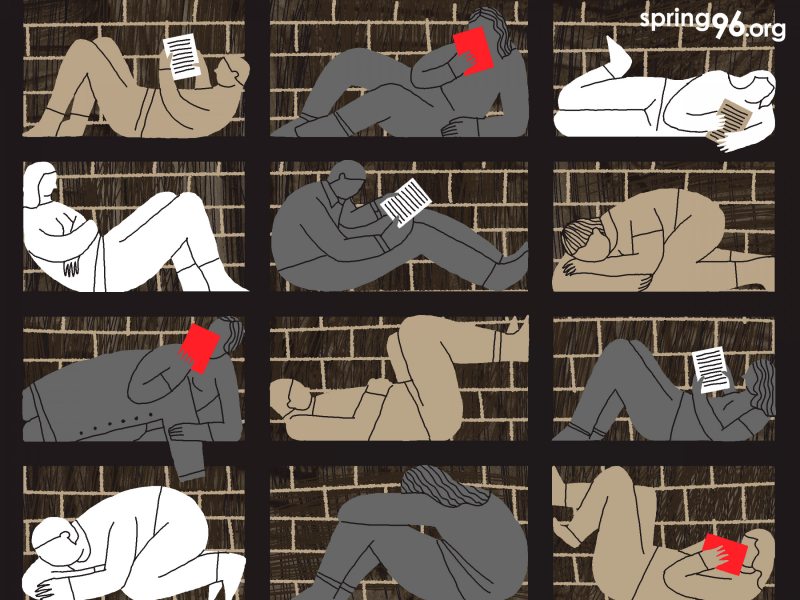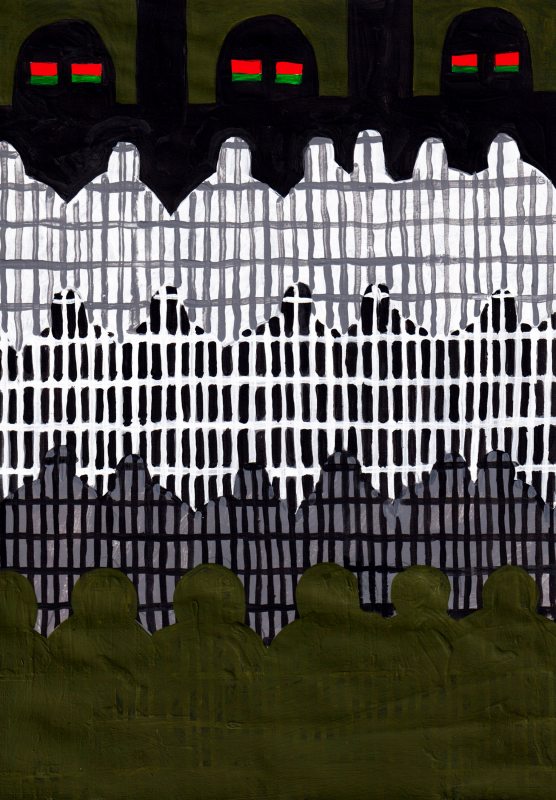Post-referendum protest detainee: “Women in the cell did not know that the war had started”
On 27 February 2022, the referendum day, around a thousand protesters were detained in Belarus. People were arrested at polling stations and at home for leaving comments in support of Ukraine on social media, or while attempting to come together for peaceful assemblies.
Yulia was one of them [last name is not disclosed for security reasons]. She told Viasna about the detention conditions at Minsk temporary detention center (TDC) during those days, the police’s attitude toward the detainees, as well as the reasons for her departure from the country.
"A guard started texting friends from my phone"
On 27 February 2022, Yulia spoiled her ballot paper at a polling station and decided to walk to the point where a rally was supposed to begin – she wanted to see what was going on in the city. When she reached Kolasa Street, she saw a stampede: police officers were dispersing women. Yulia started filming what was happening on her phone.
“Those women were in a fighting mood,” she recalls. “The police demanded that they disperse, but the protesters kept repeating that they weren't going anywhere because they grew up here and were on their soil. As usual, undercover cops used their phones to film everything. I got angry, took out my phone, too, and started filming them trying to detain these women. Someone grabbed me and brought me into a tinted-glass van – such vans were parked near every polling station that day.”
They seized Yulia's phone and found that she was subscribed to “extremist” channels and had photos from the 2020 protests. The officers tried to argue that the protesters deluded themselves and the police officers were the victims of the whole situation.
“They complained that their children were prejudiced when people found out where their fathers worked,” Yulia says. “They blamed us, although I tried to hint that it was because the fathers beat people up. They would deny it and say it wasn’t true, that nothing like that had happened.”
There were armed officers at the police station. For an hour Yulia stood at the wall in front of Lukashenka’s portrait.
“While I was standing, I heard a policeman talk to his daughter,” Yulia recalls. “He told her to go straight home after school, and in case she was detained by mistake, to tell the police that her dad was a riot policeman and to give them his personal number. He also asked her to warn her friends and her mother about potential arrests. Thus, they understood that on that day, they snatched people indiscriminately.”
While the police were processing Yulia, one of the officers used her phone to text her friends on social media that she was okay, and posted on her Instagram page that she supported the regime.
“One policeman tried to release me,” Yulia recollects. “At first he kept asking me why we wouldn’t stay at home and raise children, then he sighed and intended to take me out of the room. The officer who was playing with my phone began to yell at him: “Where are you taking this bitch? Who do you think you are? You’re about to lose everything!"
"That laughter of the riot police officers is unfogettable"
Yulia was then brought to the TDC. She and another girl spent about 40 minutes in the exercise yard. There were bars on the top and ice on the walls and floor. The girls were trying to get warm when one of the guards came into the yard and asked: "Why are you so itching to protest? You just don't have kids – that's why you're fooling around!"
“We were ten people in a regular six-person cell,” Yulia says. “There were three families among us: mothers followed their daughters after they got arrested. Some were taken from the polling stations, some got arrested on a tip-off, and some would be kidnapped from homes in light clothing. A young woman and her husband were arrested at home by riot police because the man had shared a post about the referendum on social media. A female librarian, a true dandelion, said she just couldn’t stay at home when something like that was happening. People were brought in all night. It was very cold in the cell; there was no bedding. We warmed each other up as best we could.”
At the trial, where the same witness testified against all the detainees, Yulia was sentenced to 14 days of detention and taken to Žodzina TDC. Upon arrival, the women spent half an hour outside with their hands behind their backs.
“When we were taken inside, it felt like a three-ring circus”, Yulia says. “Riot policemen were running around waving their batons. They didn’t touch the women but yelled at the guys: 'Quiet, don't look up! Shut the fuck up!’ Such bullshit conversations, with occasional strikes of clubs against the wall. Then they led us down a long narrow corridor, like a catacomb, and we were yelled to run faster. I almost tripped over my long coat. We could finally breathe out only when we got into a cell.”
The six-person cell housed 20 people, all of them political detainees. The stories were similar to those Yulia had heard in Minsk TDC: some were detained at a rally, others – while photographing riot police. A couple was detained at the entrance to their condo. On the way to the police station, they decided to leave the country after their release.
“There were also women arrested on 15 February who didn’t even know that the war had started,” Yulia recalls. “They couldn’t believe it. Some of the guards would tease us saying, ‘Well, we’ve taken Kyiv, now Russia will be everywhere. You have lost.’ They also enjoyed raiding the cell laughing and throwing our stuff around.
Some women were detained at ‘preventive conversations’, allegedly for yelling and throwing themselves at the police. Looking at an intelligent woman of 55 one understood it was a frame-up. One of them was accused of throwing some papers off the table, while there was no table in her interrogation room. A research assistant was charged with ripping off some policeman’s stripes. She was initially detained because her name sounded like the name of another activist. A skinny granny, an old gummy woman, was detained with her son who had developmental challenges. Some inmates developed psoriasis caused by stress. If it wasn’t for the mutual support, we wouldn’t have made it. And so we played, did stretching, discussed soap operas.”
The housing conditions were horrible: the mattresses were smelly, no sheets, the light was constantly on, and inmates were not offered any exercise. The women had to try hard to get some sanitary pads, and at first, they were given gauze patches instead, which later were used as toothbrushes and washcloths.
“The young guards who just joined the force as part of internships helped us,” Yulia recalls. “When I got a fever, one even gave me a couple of ibuprofen pills and told me to hide them under an insole. Some complained that after 2020 they started having problems with girls: when dates found out that the guys worked for the police, they would stop communicating. One even told a story of how he met a girl in TDC, went on a couple of dates with her, and then she leaked his data to the protesters.
The worst thing was when they started beating up male political inmates after lights out. The cell next door would open and they would ask everyone to get out. They would make the inmates squat, do push-ups, and had them recite: ‘I will never break the law again.’ They would beat them anyways after. That laughter of the riot police is unforgettable. That would go on for about 15 minutes, and you would sit still and feel fear, pain, and shame at the same time – they're beating people, and you're scared they're coming after you."
When Yulia was released, they didn't give her phone back – it was seized for some examination. The woman decided not to wait for the findings and left for another country. There she was sheltered by Belarusian volunteers, who helped her in any way they could. Yulia found a job and a place to live.
“So far I’m not planning anything, I don’t have energy for that,” Yulia shares. “The situation is unstable. Recently I found out that a criminal case was started against me. Now I am in a vicious circle and completely off-balance: you know for sure that you can’t change anything there, while nothing is clear here.”



















